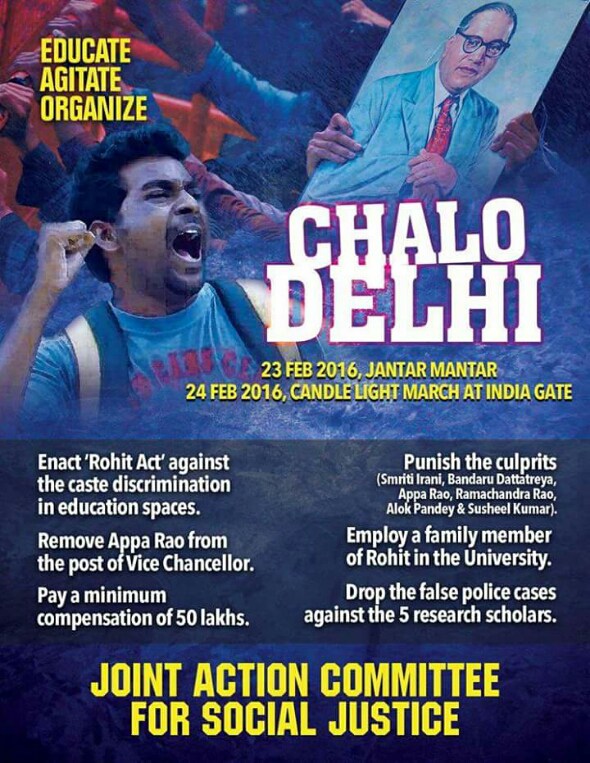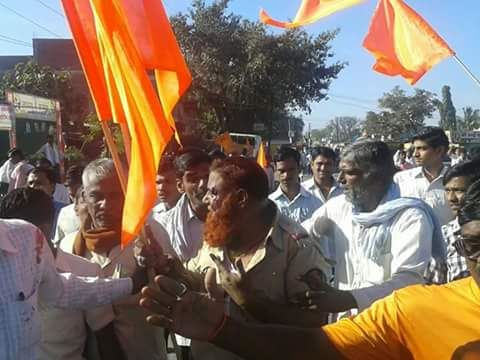We, the undersigned members of the Bangalore Research Network and a consortium of academics and researchers from Bangalore, declare our solidarity with the students and faculty of the Jawaharlal Nehru University, New Delhi protesting the illegal police arrest of JNUSU president Kanhaiya Kumar on charges of sedition. We unequivocally stand by them in affirming that universities are autonomous spaces for the free expression of a plurality of beliefs and cannot become military spaces of thought control that go against the very grain of a democratic society. With them, we condemn the blatantly authoritarian attempt by the police and the central government to witch hunt students on the basis of their political beliefs. We also condemn the unethical media trial of JNU students such as Kanhaiya Kumar and Umar Khalid.
In a speech that is now widely available on the internet, Kanhaiya Kumar spoke critically of the BJP government policies at a peaceful student meeting held at JNU which was well within his rights by the laws of the land. This occurred a day after a group of unidentified students shouted slogans at an event that he had no part in organizing. Legal luminaries have opined that those slogans about the rights of Kashmiris to independence from Indian military oppression over the last few decades, whether one might agree with them or not, do not amount to sedition. Kanhaiya Kumar was, however, arrested by the police for ‘anti-national’ behaviour and for violating sedition laws against incitement of violence. With no proof to substantiate the charge of sedition, his arrest can only be read as a reflection of the authoritarian nature of the current Indian government and its intolerance to any dissent. JNU is but the latest example of attempts to stifle dissenting student voices in university campuses across India, including others at FTII, BHU and University of Hyderabad. This is reflective of the current climate where higher education is being viewed as purely instrumental, captured by the logics of the neoliberal state and capital.
As researchers, scholars, and academics, we are extremely concerned with the manner in which the ruling government has so blatantly set aside India’s longstanding commitment to plurality in belief. The space and freedom to express diverse and divergent beliefs and opinions are the foundations for critical thought and expression that university spaces cultivate. We urge the Vice Chancellor of JNU, who gave the police permission to wrongfully detain and arrest JNU students, to recognize the momentum of support building up for them and to immediately step in to safeguard their rights.
Dated: February 22, 2016
Signatures in alphabetical order
- Abeer Kapoor, Alumnus, Azim Premji University, Bangalore
- Abhishek Hazra, Srishti Institute of Art, Design and Technology, Bangalore
- Aditi Arur, Consultant, J-PAL South Asia, Bangalore
- Amman Madan, Azim Premji University, Bengaluru
- Andrea Wright, Department of Anthropology, Brown University, Rhode Island
- Anjali Shivanand, Centre for Child and the Law, National Law School of India University, Bangalore
- Aparna Sundar, Visiting Faculty, Azim Premji University, Bangalore
- Andaleeb Rahman, Postdoctoral Fellow, Indian Institute for Human Settlements, Bangalore
- Anwesa Bhattacharya, Indian Institute of Science, Bangalore
- Archit Guha, Centre for Public History, Bangalore
- Asha Verma, Alumnus, Azim Premji University, Bangalore
- Ashwin, Independent Researcher, Azim Premji University, Bangalore
- Atreyee Majumder, Azim Premji University, Bangalore
- Avishek Ray, NIT Silchar
- Bitasta Das, Indian Institute of Science, Bangalore
- Debjani Banerjee, Srishti Institute of Art, Design and Technology, Bangalore
- Devaki, L., Azim Premji University, Bangalore
- Dhruva Desai, Alumnus, Azim Premji University, Bangalore
- Elizabeth Thomas, Centre for the Study of Culture and Society, Bangalore
- Gayatri Menon, Azim Premji University, Bangalore
- Garima Jain, Indian Institute for Human Settlements, Bangalore
- Girija K P, Centre for the Study of Culture and Society, Bangalore
- Gowri Vijayakumar, Department of Sociology, University of California, Berkeley
- Hemangini Gupta, Department of Women’s Gender and Sexuality Studies, Colby College, Maine
- Issac Arul Selva, Human Rights Activist, Bangalore
- Jasmeen Patheja , Blank Noise.
- Jyothsna Belliappa, Bengaluru
- Kanthi Krishnamurthy, Centre for the Study of Culture and Society, Bangalore
- Kavya Murthy, Bangalore
- Kinnari Pandya, Azim Premji University, Benguluru
- K Ravichandran, Student, Azim Premji University , Bangalore
- Lakshmi Arya, Independent scholar and writer, Bangalore
- Lata Mani, Independent Researcher, Bengaluru
- Lindsay Vogt, Department of Anthropology, University of California, Santa Barbara
- Madhu Bhushan, Independent (re)searcher-activist, Bangalore
- Manisha Anantharaman, Justice Community and Leadership, Saint Mary’s College of California
- Maia Barkaia,(JNU, 2010), Tbilisi State University (Tbilisi) and University of Oxford, Oxford.
- Manu V. Mathai, Azim Premji University, Bangalore
- Muthatha Ramanathan, Bangalore
- Navdeep Mathur, IIM Ahmedabad
- Narendra Raghunath, Srishti Institute of Art, Design and Technology, Bangalore
- Neenu Suresh, National Law School of India University, Bangalore
- Nikunja S. Bhuyan, Student, Azim Premji University, Bangalore.
- Nimisha Agarwal, National Institute of Advanced Studies, Bangalore
- Nitya V, Bengaluru
- Padma Baliga, St. Joseph’s College, Bengaluru
- Padmini Ray Murray, Srishti Institute of Art, Design and Technology, Bangalore
- Pallavi Gaur, Student, Azim Premji University, Bangalore
- Pooja Sagar, Srishti Institute of Art, Design and Technology, Bangalore
- P. P. Sneha, Bangalore
- Prakriti Prajapati, Researcher, ATREE, Bengaluru
- Pranesh Prakash, Bangalore
- Preeti Kharb, Indian Institute of Astrophysics, Bangalore
- Rajeev Kumaramkandath, Christ University, Bengaluru
- Rameshwara Nand Jha, Alumnus, Azim Premji University, Bangalore
- Rashmi Sawhney, Srishti Institute of Art, Design and Technology, Bangalore
- Renny Thomas (JNU 2015), Department of Sociology, Jesus and Mary College, University of Delhi
- Riddhi Pandey, Student, Azim Premji University, Bangalore
- Robert M Geraci, Manhattan College (former Visiting Scholar at IISc), New York
- Rolla Das, National Institute of Advanced Studies, Bangalore
- Sanam Roohi, NIAS, Bangalore and AISSR, University of Amsterdam
- Sarah Jacobson, Azim Premji University, Bangalore
- Savitha Suresh Babu, National Institute of Advanced Studies, Bangalore
- Sahil Sasidharan, Associate – Academics & Research, IIHS, Bangalore/Bengaluru
- Sazana Jayadeva, The German Institute of Global and Area Studies, Hamburg
- Scott Sorrell, Department of Anthropology, Cornell University, New York
- Sharad Sure, Azim Premji University, Bangalore
- Sharmadip Basu, Azim Premji University, Bangalore
- Shoibal Chakravarty, National Institute of Advanced Studies, Bangalore
- Shreyas Sreenath, Department of Anthropology, Emory University, Atlanta
- Shreyas Srivatsa, Urban Planner & Architect, Bangalore
- Shrishtee Bajpai, Alumnus, Azim Premji University, Bangalore
- Shruti Ajit, Researcher, Kalpavriksh, Pune
- Simy Joy, Independent Researcher, Ely, England
- Smriti Srinivas, NAGARA, Bangalore
- Soundarya Iyer, Student, NIAS, Bangalore
- Sreechand Tavva, Post Graduate Student, Azim Premji University, Bangalore
- Sreeparna Chattopadhyay, Azim Premji University, Bangalore
- Subadra Panchanadeswaran, Adelphi University, New York
- Subir Rana, National Institute of Advanced Studies, Bangalore
- Sufaid V, Azim Premji University, Bangalore
- Sunandan, Azim Premji University, Bangalore
- Sunayana Ganguly, Independent researcher and entrepreneur, Bangalore
- Suraj Jacob, Azim Premji University, Bangalore
- Tarang Singh, Azim Premji University, Bangalore
- Tathagata Biswas. Azim Premji University, Bangalore
- Vasanthi Mariadass, Srishti Institute for Art Design and Technology, Bangalore
- V R Vachana, Alumna, Azim Premji University, Bangalore
- Vidhya Raveendranathan, Centre For Modern Indian Studies, Georg- August- University, Gottingen, Germany
- Vikas Maniar, Azim Premji University, Bangalore
- Vinay K Sreenivasa, Alternative Law Forum, Bangalore
- Vineeta, Alumnus, Azim Premji University, Bangalore
- Vineeth Krishna E, Centre for Law and Policy Research, Bangalore
- Vivek Mishra, Alumnus, Azim Premji Univerisity, Bangalore
- Vrashali Khandelwal, Student, Azim Premji University, Bangalore



